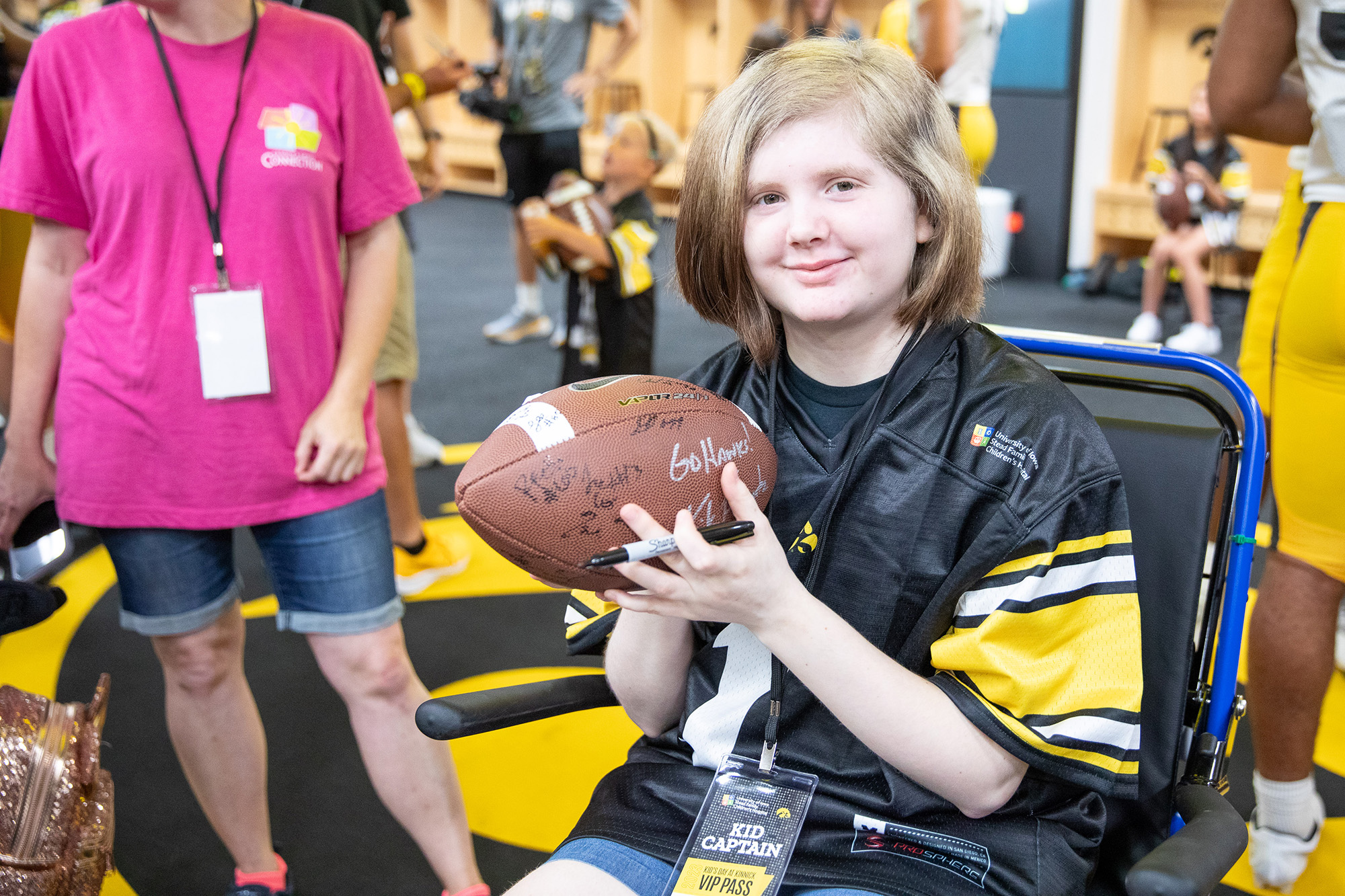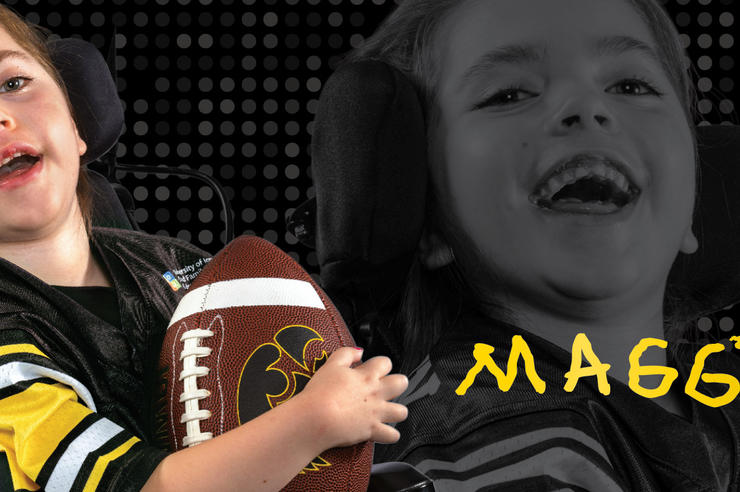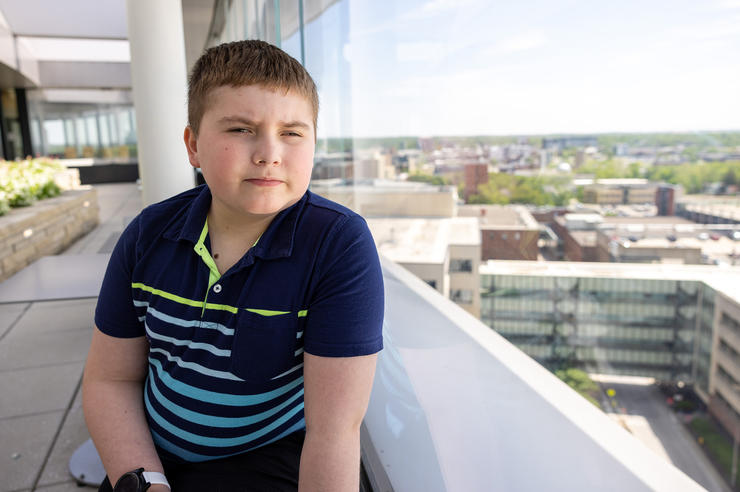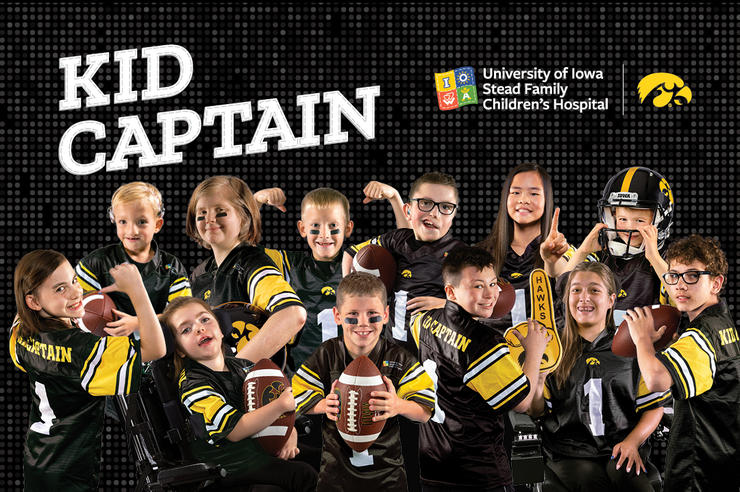Meet Kid Captain Gabby Ford

Resilience is abundant in the personality of Gabby Ford, 17, of Fairfield, Iowa. With support from University of Iowa Stead Family Children’s Hospital, she and her family have faced off for the past seven years against a relentless brain tumor.
When she was 10, Gabby was flown to the children’s hospital after a scan at her local hospital revealed a buildup of fluid and a mass in the middle of her brain.
She was diagnosed with hypothalamic pilocytic astrocytoma, a brain tumor that originates from star-shaped cells called astrocytes.
“That was the beginning of our journey,” Gabby’s mother, Mandy, recalls.

University of Iowa Stead Family Children’s Hospital is Iowa’s only nationally ranked children’s hospital, offering all pediatric subspecialties and caring for kids from all 99 counties in Iowa. We provide world-class pediatric care that families trust—and kids deserve.
Advocating for answers
The Fairfield girl previously had influenza and was taken to the local hospital’s emergency room when her parents thought she might be dehydrated. Initial tests didn’t indicate anything unusual, and she was sent home after a few days in the hospital. The next day, Gabby complained of a headache and collapsed. Gabby’s dad, David, a paramedic at the time, said she needed to return to the hospital.
“We insisted on a CT scan,” Mandy says. “By the time they came back to tell me the results, they already had a helicopter in the air.”
Upon arriving at UI Stead Family Children’s Hospital, an emergency external ventricular drain surgery was performed to relieve pressure on Gabby’s brain, but the procedure had to be repeated and a second device was added.
Two days later, doctors performed a seven-hour debulking surgery to safely remove as much of the tumor as possible and deflate its cystic portion.
“The following morning, she made history as the fourth pediatric intensive care unit patient moved into the new children’s hospital,” Gabby’s mother says. “So many of the doctors and staff we met earlier on are still part of our team today—neurosurgeons, oncologists, child life specialists, physical therapists, occupational therapists, music therapists—every staff member helped us on this new path.”
Like coming home
Near the end of Gabby’s 16 days in the PICU, doctors placed a shunt to help relieve the pressure on her brain. She then began chemotherapy to stop the growth of any remaining tumor issue, causing Gabby to lose the rest of her hair that wasn’t already shaved off.
Unfortunately, new scans showed the cystic portion of her tumor was causing fluid to build up again and the solid portion had increased.
In July 2017, Gabby underwent an open craniotomy, in which surgeons removed part of her skull to access her brain, after which she spent another 10 days in intensive care at the children’s hospital.
“It was like coming home,” Mandy says. “The staff remembered our earlier stay and it made us feel more at ease.”
After completing a second year of chemo, Gabby rang the bell to signal the end of treatment in July 2018, but unfortunately, the tumor continued to grow.
“When your child needs care, this is the best place to be. The care team truly listens to your concerns and are willing to go the extra step to make you feel included. You’re not just a patient or an appointment or a procedure—you’re family.”
‘The tumor was relentless’
Gabby’s care team collaborated with another hospital when she underwent surgery offsite in 2019. She would then return to UI Stead Family Children’s Hospital looking for further care options.
“The tumor was relentless,” says Mandy. “We were looking for a new option to fight the disease.”
Finding a new approach took time. Her oncologist worked to get her approval for Trametinib—a medication that was then not FDA-approved for pediatric brain tumors, her mother notes—but her cardiac function decreased more than was allowed by the study, and while that function has since returned to normal, she had to discontinue the drug. Gabby’s case was considered stable for roughly a year and a half, but in 2021, an MRI showed continued growth of the tumor.
After discussing several options, Gabby’s family wanted to utilize a new medication, called DAY101 (Tovorafenib) that directly targeted her type of tumor mutation. It would take roughly five months to get her approved for the new drug.
“Insurance would not approve us going out of state for the drug study and treatment, so we argued, ‘If we can’t get her to the drug, why can’t we get the drug to her?’” Mandy says. “It took an incredible effort from oncology and the pharmacy team, and she became the first patient at UI Stead Family Children’s Hospital to receive the DAY101 drug.”
The Pediatric Brain Tumor Clinic at University of Iowa Stead Family Children’s Hospital is the first of its kind in Iowa and one of just a few in the United States. The clinic is multidisciplinary and collaborative, which means specialists from a variety of areas come together to create a personalized treatment plan for every patient.
Gratitude for a world-class team
Aside from surgery, DAY101 is the only treatment that has decreased the tumor’s size. Her parents say the most noticeable side effect is that Gabby’s hair color turned platinum.
“We have experienced incredible highs and lows, and our team has been with us through it all,” Mandy says.
The tumor has lasting effects on Gabby’s memory, particularly with retaining information.
“She can’t tell you what she learned or didn’t learn,” David says of her schooling. “There are a lot of holes in her long-term memory, as well.”
“She tells her friends the same jokes 10 times a day,” Mandy adds with a smile. “She’s still upbeat, happy-go-lucky and would like to be in school every day if she could.”
Now 17 and a high school junior, Gabby aspires to be a writer and enjoys math.
“Somehow, after her second brain surgery, she likes numbers now,” her mother laughs. “She’s our warrior.”
Gabby has endeared herself to the staff on Level 11 and other departments throughout the hospital, where the family shares “Gabby’s Hugs”—a piece of Hershey’s chocolate—with staff members they encounter.
“She inspires us every day to never give up and always look for the positive,” Mandy says, crediting Gabby’s care team for her continued progress. “When your child needs care, this is the best place to be. The care team truly listens to your concerns and are willing to go the extra step to make you feel included. You’re not just a patient or an appointment or a procedure—you’re family. They have saved our child’s life more than once and I wouldn’t hesitate to recommend seeking treatment here.”



